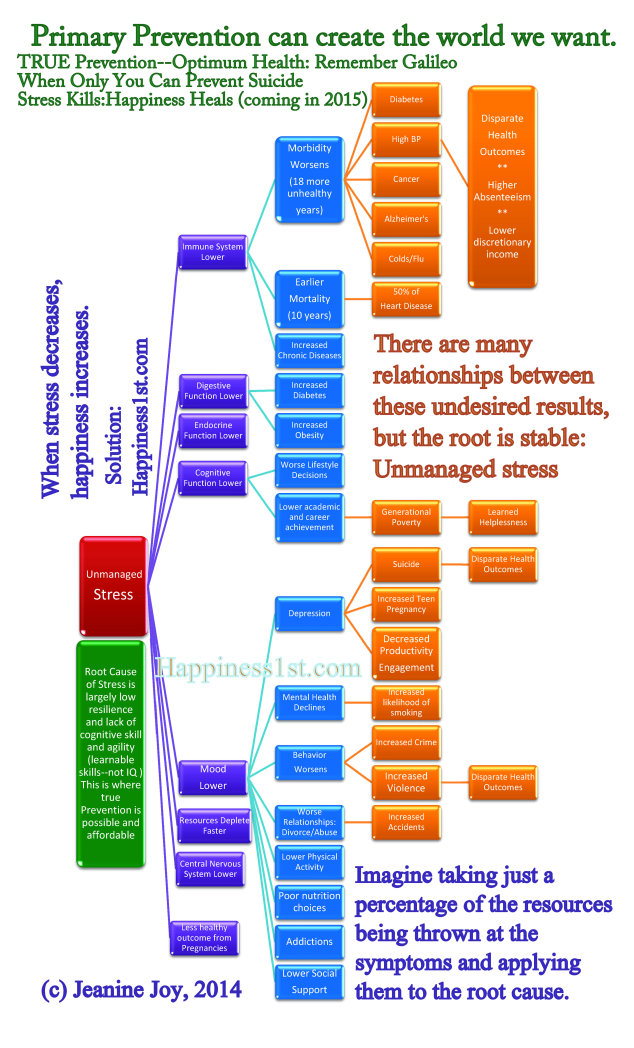Stress Management = Primary Prevention
One reason we are having so little success stopping the growth of public health and welfare problems is because almost all society’s efforts are directed toward the symptoms, not the root cause of the problems.
It is like getting a flat tire because you have a strip of spikes on your driveway, so you fix your flat tire, but then you drive over the strip of spikes all over again. The problems are growing because the root cause is not being fixed. No one who realizes that is what they are doing would do that. The reason  society does not realize it is because we’ve been misled about some very basic things that affect our health and wellbeing. Not misled on purpose, but because people have believed a variety of false premises for generations and only now is science demonstrating the falsity of those premises loud enough that some people are beginning to recognize it.
society does not realize it is because we’ve been misled about some very basic things that affect our health and wellbeing. Not misled on purpose, but because people have believed a variety of false premises for generations and only now is science demonstrating the falsity of those premises loud enough that some people are beginning to recognize it.
Our parents, teachers, clergy, and others teach us what they’ve been taught without realizing that they were given false information. We are very lucky to live in this time when science knows enough about how our brains work–about things that go on below the level of conscious thought–things that can help us or hurt us, depending on how they are programmed to work.
There are all sorts of conspiracy theories about why the poor are getting poorer and the rich richer but the primary reason is that this underlying programming that literally affects our ability to see and recognize opportunities and solutions has been programmed in a more success supportive way. Since we learn much of the programming by age 6, it is passed on by our parents and other early teachers. If their programming is not supporting success, then our programming probably won’t either.
But…we now understand how to change the programming in ways that improve success in all areas of life. Relationships, health, success, well-being and other areas can improve dramatically when you change the programming your automated responses use.
Today, very few people are enjoying optimal programming of their automated processes. Even among those who are wealthy, there are relationship problems, loneliness, feelings of inadequacy, depression, addictions, and more. It is difficult for someone who is not wealthy to imagine how someone who has that many resources can have so many problems–but the root cause is the same. Their automatic programming is not optimized.
Understand that consciously you are usually focused on one thought at a time, but your automatic processes may be doing hundreds of things each minute. They filter the information your senses pick up and provide only the information the automatic processes have deemed relevant to your conscious mind. The automatic processes do not pass information to your conscious mind that conflicts with your beliefs. If you begin shifting your programming and changing beliefs that aren’t serving your highest good, you’ll be as amazed as I was by how changing an underlying belief changes the world that your mind is aware of. Until you try it is difficult to understand or believe. Once you try it, it is blatantly obvious.
In our programs we teach our students how to decide how they want to program their automatic processes and how to change established patterns of thought to reduce stress in their life and begin thriving more.
If you’re not ready for a class, try one of my books. TRUE Prevention–Optimum Health: Remember Galileo addresses the issue from the perspective of health but the stress reduction techniques that help you reprogram your automated processes will benefit every area in the chart. When Only You Can Prevent Suicide was written to address the growing depression and suicide problem with a solution that can be applied globally. The current suicide prevention strategies wait until someone is at a crisis point and focus on the warning signs that an individual may be considering suicide. We can do so much better. The same strategies that can improve health can greatly reduce the potential someone will someday become suicidal. My knowledge of the truth about some of the false premises mentioned previously has helped me bring more than one person back from the brink of suicide when the person was at a crisis point.
In When Only You Can Prevent Suicide I also provide guidance about how to help someone who has attempted suicide or suffered a loss in their life. Oftentimes individuals do not express their care and concern at such times, not because they don’t care, but because they are unsure of what to say. At a vulnerable time like that, the lack of contact can be misinterpreted to mean lack of caring and make matters worse. If someone you care about has suffered a loss–whether it is loss of a job, relationship, loved one to death, status, or physical health–contact from you can make a big difference.
Because we tend to become accustomed to whatever our normal circumstances are–even when they are less than ideal–we do not realize how good life can become. Wouldn’t you like to know?

